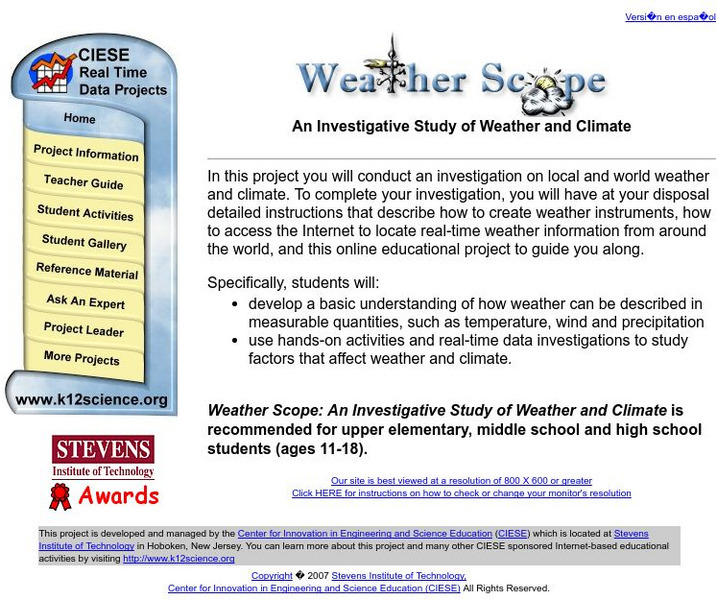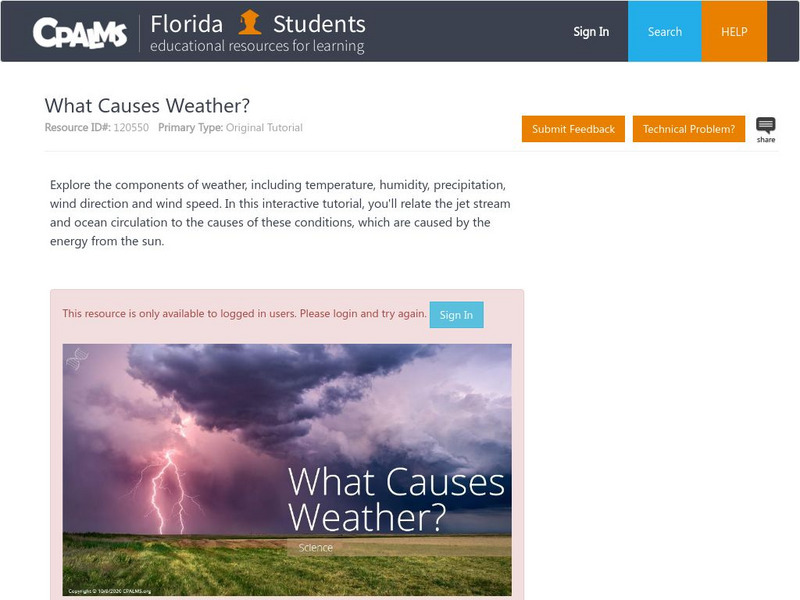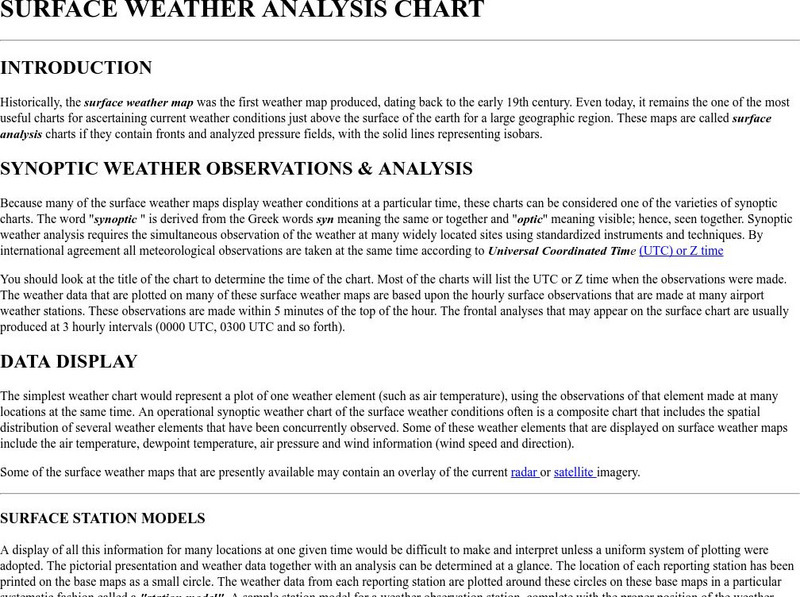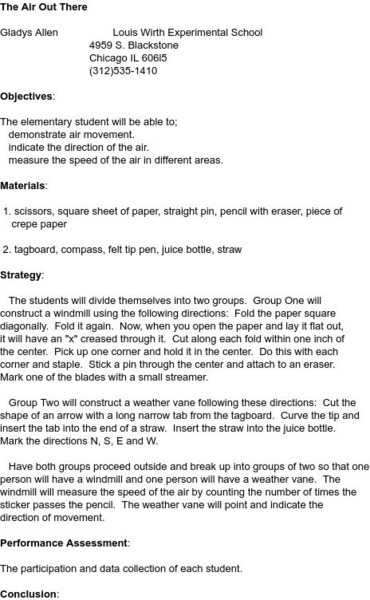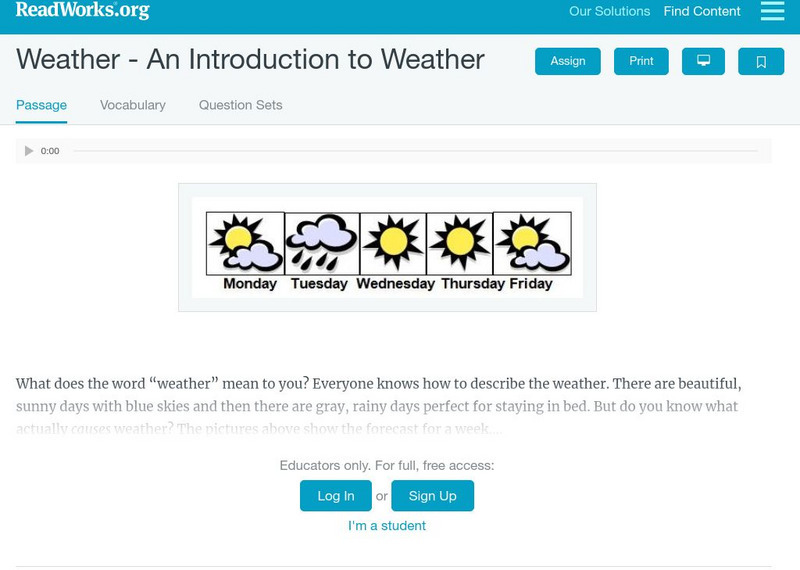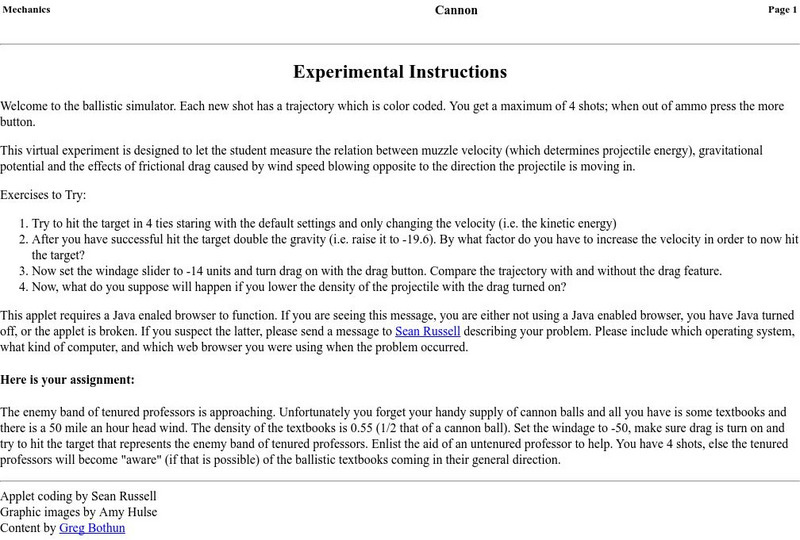Hi, what do you want to do?
Curated OER
Weather
Students track wind speed and direction, barometric pressure, air temperature, and precipitation for a month using a newspaper. They chart the data over a months time.
Curated OER
Three Clouds Activity
Students explore how clouds are produced through three different age-appropriate hands-on experiments.
Curated OER
Operation Weather Station
Students work in cooperative groups to create a working weather station. Tkey use the weather station to collect weather data over a one-week period. Students compare the data from their weather station to actual weather information...
Curated OER
You Really "Affect" Me
Middle schoolers examine the effects of variables. They view a video which introduces the concepts, take part in an internet-based activity, then engage in a hands-on activity which allows them to practice what they have been studying.
Curated OER
SkyHighScrapers
Pupils investigate quadratic functions. In this Algebra I/Algebra II instructional activity, students determine the equation of a quadratic function that closely matches a set of points. Pupils investigate the necessary...
Curated OER
#22 Frames of Reference: The Basics
Students explore the concept of frames of reference in physics.
Curated OER
Meteorology
Seventh graders examine the job of meteorologists. They decide which characteristics of the atmosphere that meteorologists focus on. They use local weather maps from newspapers to predict weather in their area.
Utah Education Network
Uen: Trb 4:2 Investigation 3 Wind
Learn how to measure the direction and speed of wind.
American Geosciences Institute
American Geosciences Institute: Earth Science Week: Build Your Own Weather Station
Students are guided in how to build their own weather station that will measure temperature, humidity, precipitation, atmospheric pressure, and wind direction and speed.
Center for Innovation in Engineering and Science Education, Stevens Institute of Technology
Ciese Real Time Data Projects: Weather Scope: A Study of Weather and Climate
Use real-time data to study factors that affect weather and climate, create weather instruments, and share data with students around the world.
CPALMS
Florida State University Cpalms: Florida Students: What Causes Weather?
Determine parameters of weather; including specifically temperature, humidity, precipitation, wind direction and wind speed in this tutorial. During this tutorial, you will relate the jet stream and ocean circulation to the causes of...
NOAA
Noaa: Photo Library: Solar Powered Surface Automated Measurement (Sam) Site
The National Oceanic and Atmospheric Administration provides a photo library of severe weather formations and the instruments that measure them. Here you can find a photograph of a solar-powered Surface Automated Measurement (SAM) site....
University of Wisconsin
Atmospheric and Oceanic Sciences: Surface Weather Analysis
Explains the use of synoptic weather analysis in preparing weather maps and forecasting. Discusses the use of symbols as well.
Weather Wiz Kids
Weather Wiz Kids: Wind
Wind is air in motion. It is produced by the uneven heating of the earth's surface by the sun. Since the earth's surface is made of various land and water formations, it absorbs the sun's radiation unevenly. Two factors are necessary to...
PBS
Nova: A Five Day View of the Jet Stream
This animated 5 day forecast for the jet stream shows wind direction and wind speed. The forecast was generated on January 1, 2001 by the Fleet Numerical Meteorology and Oceanography Center.
Math Graphs
Houghton Mifflin: Math Graphs: Direction and Vectors 3 [Pdf]
Students use a weather map to determine the points where the wind speed is the greatest. The resource consists of an enlarged printable version of a weather map available in PDF format.
Science and Mathematics Initiative for Learning Enhancement (SMILE)
Smile: The Air Out There
Cooperative learning activity in which students will create a windmill and a weather vane. Students will find the direction of wind and the speed relative to the spinning windmill. Great for K-2.
Read Works
Read Works: Weather : An Introduction to Weather
[Free Registration/Login Required] Requires free membership.T his passage is a stand-alone curricular piece that reinforces essential reading skills and strategies and establishes scaffolding for vocabulary learning. It contains...
Science Struck
Science Struck: A List of All Weather Symbols and Their Meanings
Provides a comprehensive list of weather symbols used on weather maps.
Other
California Energy Commission: Science Projects: Make an Anemometer
Nice brief description of this wind speed device and the directions to make your own.
PBS
Pbs Nova: Pilot the Wright Brothers' Flyer
In this interactive, find out how the Wright brothers' design of the first flyer provided lift and speed, and allowed the pilot to make adjustments in response to changes in wind speed and direction.
Read Works
Read Works: Tornado Scientists
[Free Registration/Login Required] An informational text about tornadoes and the scientists who study them. A question sheet is available to help students build skills in reading comprehension.
University of Oregon
Uo: Cannon Simulator: Experimental Instructions
This virtual experiment is designed to let the student measure the relation between muzzle velocity (which determines projectile energy), gravitational potential and the effects of frictional drag caused by wind speed blowing opposite to...














